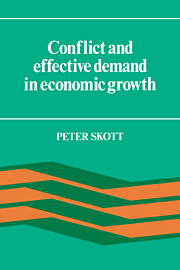Book contents
- Frontmatter
- Contents
- Guide to text notation
- Acknowledgements
- 1 Introduction
- 2 Methodological issues
- 3 A survey of some post-Keynesian and neo-Marxian ideas
- 4 The model
- 5 Ultra-short-run, short-run and steady-growth equilibria
- 6 Investment, instability and cycles
- 7 Finance and money-wage neutrality
- 8 Distributional questions in neo-Marxian and post-Keynesian theory
- 9 Final remarks
- Bibliography
- Index
2 - Methodological issues
Published online by Cambridge University Press: 05 January 2012
- Frontmatter
- Contents
- Guide to text notation
- Acknowledgements
- 1 Introduction
- 2 Methodological issues
- 3 A survey of some post-Keynesian and neo-Marxian ideas
- 4 The model
- 5 Ultra-short-run, short-run and steady-growth equilibria
- 6 Investment, instability and cycles
- 7 Finance and money-wage neutrality
- 8 Distributional questions in neo-Marxian and post-Keynesian theory
- 9 Final remarks
- Bibliography
- Index
Summary
INTRODUCTION
The general perspective of the theory offered here differs from that of many previous formulations in the post-Keynesian and neo-Marxian literature in at least three ways. The first difference is the presentation of a ‘unified’ theory of a pure capitalist economy. The theory is unified in the sense that it covers a range of issues not normally analysed within the same analytical framework. Trade-cycle fluctuations are usually examined separately from monetary issues; the analysis of long-term growth is normally carried out in the context of a special long-run model which leaves out many of the concerns of short-term models. Taylor (1983), for instance, presents a number of different models each designed to illuminate a particular set of problems, and in Marglin's (1984a) attempt at a synthesis of Marx and Keynes the emphasis is on long-term growth while short-run issues as well as monetary and financial aspects receive little attention. In contrast, the present book attempts to deal with these and other issues within a single unified framework.
Secondly, stability issues feature prominently in the analysis. In spite of the manifest fluctuations in economic activity in all advanced capitalist countries, a concern with the stability of the steady-growth path has been largely absent in post-Keynesian and neo-Marxian growth theory. The present work brings stability back on to the stage. The long-term path of the economy emerges as a sequence of (ultra)-short-run equilibria. A steady-growth path with a constant rate of growth does exist but Harrod was right: the warranted path is unstable.
The third difference concerns the analysis of behavioural relations. Good macroeconomic theory should have a microeconomic dimension: there should be a correspondence between macroeconomic outcomes and microeconomic behaviour.
- Type
- Chapter
- Information
- Conflict and Effective Demand in Economic Growth , pp. 5 - 17Publisher: Cambridge University PressPrint publication year: 1989



